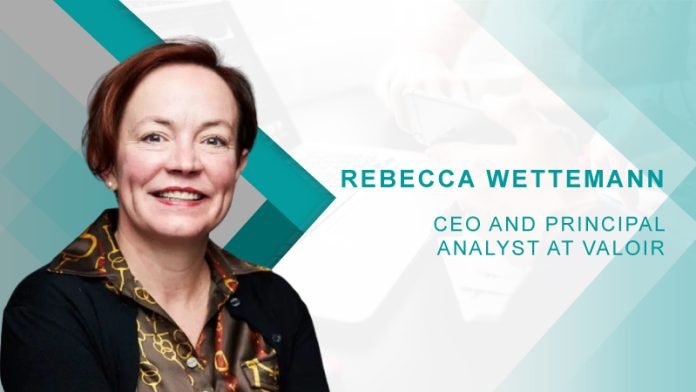Rebecca, as a tech analyst and thought leader, your expertise spans various domains like product development, go-to-market, M&A, marketing, PR, and digital transformation. How has your diverse background influenced your approach to technology and strategy?
Having covered a lot of different markets over the years and seen a lot of big changes – the move to cloud, the embedding of analytics, and now, the advent of AI – has given me the opportunity to develop a deep understanding of a lot of different parts of the enterprise software stack while also seeing how they are interdependent. It also helps me see the connections between markets, and where we can leverage learnings from one area in another. For example, many of the things we learned about getting the most value from predictive analytics in the 2000s are true about getting value from AI today, just supercharged. We can take what we’ve learned in the customer experience space and apply much of it to employee experience, and vice versa.
Your focus on coaching, talent/analytics, and AI aligns with industry trends. Can you elaborate on their significance and potential impact?
A lot of what we’re seeing in HR technology today is about enabling things that simply were impossible or cost prohibitive before, such as using technology to enable coaching at scale beyond the management suite, or being able to process and understand all the data about a talent pool to make real-time tactical and strategic decisions. This requires HR to think differently about the business case for HR technology, and be able to speak to the benefits beyond the walls of HR to the broader impact on the bottom and top line of the business.
Please state your opinion on the intersection of AI and employee experience (EX) and customer experience (CX). What potential transformations or advancements do you anticipate in this space?
Although they are not the same, there are key themes that run through both the customer and employee experience. Historically, CRM and CX have been 24-36 months ahead of HR and EX: CX went cloud first, went to embedded analytics first, went to industry models first. What we’re seeing now, however, is an interesting twist, because in many ways HR is more disciplined about data stewardship and ethics than sales and marketing has been historically. As we think about the evolution of AI in the next few years, HR has an important role to play not just in the application of AI in HR technology but in how companies set policy on the effective and ethical use of AI across the enterprise. This plays to HR’s strengths in understanding people, learning and development, and human factors as well as its ability to provide thought leadership when it comes to data stewardship. We think there will be some interesting crossovers in the tech space as well, particularly in areas like contact center where both employee and customer experience are big factors.
Your expertise spans cloud, CRM, HCM, analytics, and AI. How do these technologies enhance EX and CX, and what’s their role in Valoir’s approach?
The beauty of cloud is that companies can get rapid value with a lower upfront investment and get more value over time because they can take advantage of the ongoing innovation vendors are delivering without the cost and disruption associated with traditional software updates. That’s true across all software areas. However, ultimately getting the most value from technology comes down to people – whether it’s employees, customers, or partners in a supply or service chain. This means keeping the human factors in mind on an ongoing basis, and having the data to make decisions about people, talent, and the effective use of technology to drive greater productivity.
How do AI, Workforce Engagement Management (WEM), and ongoing education for hourly workers contribute to increased retention, cost reduction, and enhanced customer experience in the context of combatting staffing shortages?
The opportunity for career advancement is second only to salary in factors employees consider when choosing an employer. That’s why training – not just courses, but coaching and mentoring, and access to outside learning opportunities – are key in retaining talent at all levels.
What key trends do you observe in tech, especially in digital transformation and analytics/AI adoption?
Valoir’s recent research has found that more than ¾ of workers in HR roles have experimented with generative AI, making HR only behind IT employees as a cohort having tried genAI (finance and marketing employees had similar experimentation levels, while sales and service lagged far behind) – and 35 percent of the average HR person’s workday is ripe for automation.
However, HR has challenges ahead of it when it comes to AI, particularly around implementing policies and training for its effective use, and retraining employees who will be impacted/potentially replaced by AI.
How do you envision the role of technology, especially AI and WEM tools, in creating a more empowered and educated workforce?
One of the biggest potential benefits around AI and WEM is in bringing together all the unstructured data about employees and making sense of it. This leads to more personalized recommendations, better skills gap analysis, and ultimately the ability for employees to more effectively advance in their careers – if they take advantage of it.
How do you see M&A strategies evolving in tech, and what considerations should companies keep in mind?
We’re going to see an acceleration of M&A activity in tech this year, as valuations get corrected and the cost of capital limits startups’ abilities to secure additional funding. This means a sharper focus on delivering customer value, and for vendors, a sharpened focus on their ideal customer profile and how they’re differentiated.
What excites you about the future of tech in EX and CX, and what do you see as key drivers of innovation in the coming years?
Everybody’s talking about AI, but the focus on the creation part of generative AI has overshadowed some of the real opportunities for benefit around AI and NLP and making sense of large volumes of unstructured data. More of Valoir’s 2024 predictions are here. We think AI will drive a lot of innovation but will also deliver some real “uh-oh” moments in 2024. We also think that we’ll see more crossovers between CX and EX, particularly in areas where there are already firms with some overlapping expertise (like the contact center and broader enterprise platforms).
What advice would you give to young entrepreneurs looking to make a name for themselves in the tech industry?
You can never go wrong focusing on customer value. No matter what happens in the economy or political environment, companies will continue to invest in technology that brings them clear value. Bonus points go to those who can help their customer champions justify and promote the value of their technology decisions to deliver value to their organizations.
Explore HRtech News for the latest Tech Trends in Human Resources Technology.

Rebecca Wettemann CEO and principal analyst at Valoir
Rebecca Wettemann is CEO and principal analyst at Valoir, a technology analyst firm providing research and advisory services to leaders with a focus on the value of technology. With deep expertise in CRM, customer experience, HCM, employee experience, cloud, and enterprise applications, Wettemann’s team combines primary research and unique insights to help clients understand their strengths and execute strategies that maximize technology value. Wettemann also covers the future of work, user adoption, productivity, AI, and RPA with a focus on value. She is the author of numerous studies on the value of technology in the HR and EX space. Wettemann is an HR Tech Top 100 Influencer, and a sought-after speaker on the value of technology, and a resource for the business and industry press. Ms. Wettemann holds a Bachelor of Science degree in Political Science and a Bachelor of Arts degree in French from Oklahoma State University, where she was honored as a Distinguished Alumna in 2022. She also holds a Masters of Law and Diplomacy degree from the Fletcher School at Tufts University.













